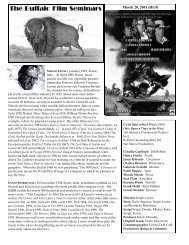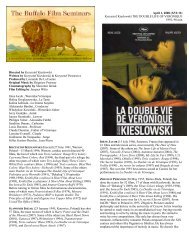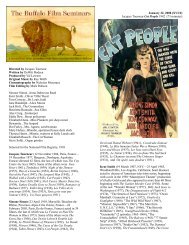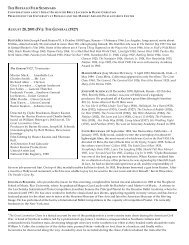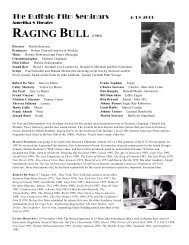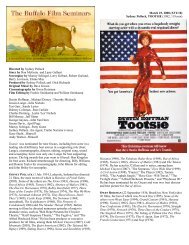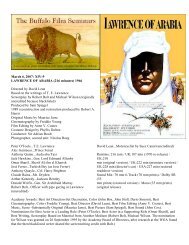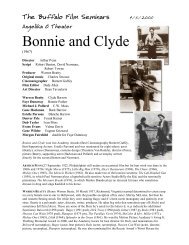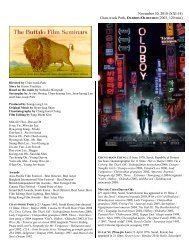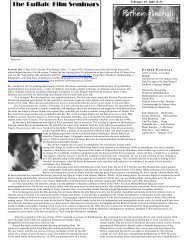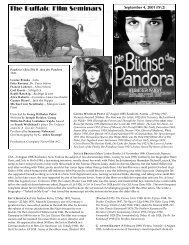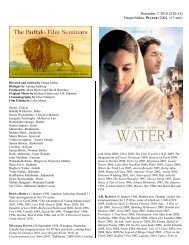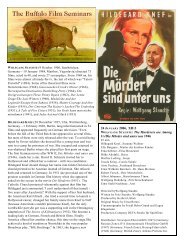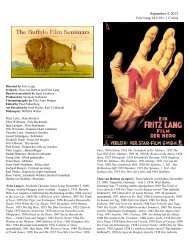November 20, 2012 (XXV:12 Aleksandr Sokurov, RUSSIAN ARK ...
November 20, 2012 (XXV:12 Aleksandr Sokurov, RUSSIAN ARK ...
November 20, 2012 (XXV:12 Aleksandr Sokurov, RUSSIAN ARK ...
Create successful ePaper yourself
Turn your PDF publications into a flip-book with our unique Google optimized e-Paper software.
unmistakeably Viscontian in its elegiac quality.<br />
The relationship between Custine and the narrator is one<br />
whose dynamic shifts as regularly as the film’s diegesis shifts in<br />
space and time. The Marquis is first presented almost as a Nosferatulike<br />
figure emerging from the shadows. Wiry, pallid, hunched and<br />
clad in black with sprigs of grey hair he becomes an irascible, laconic<br />
guide to the treasures of the Hermitage. His teacherly status is<br />
abruptly reversed when he arrives at a cold, colourless salon, filled<br />
with dust and empty frames – we are now in the time of World War<br />
II. A bewildered Marquis is warned by the narrator not to enter but he<br />
does so nonetheless, encountering a museum worker in a room<br />
depicting the hardship imposed on the Russian people and its culture<br />
during the siege of Leningrad.<br />
Tim Harte has observed that Custine “has gotten a stark<br />
glimpse of the mortality<br />
that contrasts with the<br />
film’s earlier evocations<br />
of the eternal within the<br />
ubiquitous ‘living’<br />
frames featured<br />
elsewhere in the<br />
museum.” It is the<br />
narrator now who has to<br />
provide a history lesson<br />
for the Marquis. Apart<br />
from this wartime<br />
segment, it is interesting<br />
to note that there almost<br />
nothing in the film on<br />
the Soviet era, with no<br />
mention of figures such<br />
as Lenin or Stalin.<br />
Somewhat<br />
predictably for a film<br />
whose visuals are so<br />
spectacular, the film’s sound design has been largely neglected in<br />
critical writings. There can surely be little doubt that the meticulous<br />
visual choreography is also matched by the aural. After the opening<br />
titles, and before a fade-in allows the camera to begin its flight,<br />
<strong>Sokurov</strong> introduces his narrator in complete darkness, with gusts of<br />
wind whistling on the soundtrack. The director’s own delivery is akin<br />
to that of one who has awoken from deep sleep in a state of<br />
bewilderment: “Where am I? Where are they rushing to? Has this all<br />
been staged for me? Am I expected to play a role?” If we return to the<br />
motif of the child, this emergence from darkness is of course akin to<br />
birth.<br />
As the camera progresses through the Hermitage, the<br />
soundtrack is peppered by whispers, chatter and hushed laughter from<br />
a plethora of characters. But constant throughout the film is an<br />
audible breathing – presumably of the narrator – symbolic of a culture<br />
that is living, a culture “destined to sail forever”.<br />
Harry Sheehan in LA Weekly, Jan 10-16, <strong>20</strong>03, “Russian Ark”:<br />
Writer-director Alexander (née <strong>Aleksandr</strong>) <strong>Sokurov</strong> — a perennial<br />
presence at major film festivals with such recent work as Taurus<br />
(<strong>20</strong>00), Moloch (1999) and, earlier and much more satisfactorily,<br />
Mother and Son (1996) — is on the whole more respected than<br />
beloved. Before attending film school, the now-51-year-old country<br />
boy – turned – St. Petersburger got his university degree in history,<br />
<strong>Sokurov</strong>—<strong>RUSSIAN</strong> <strong>ARK</strong>—4<br />
and has looked there for his subject matter ever since. Only it's not<br />
just history, to hear his admirers tell it: On <strong>Sokurov</strong>'s own official<br />
Web site, one Russian critic describes the filmmaker's subject as<br />
"man and his fate" — surely a daunting ambition for anyone's<br />
lifework, and one that has led to accusations of grandiosity.<br />
Certainly, only an artist with an inflated sense of mission could<br />
conceive of his work as a kind of biblical ark for 300 years of modern<br />
Russian history. Russian Ark opens with a black screen and the voice<br />
of an unnamed filmmaker (<strong>Sokurov</strong>'s, actually) explaining that he's<br />
just regaining consciousness after some mysterious "accident" —<br />
perhaps, the viewer may come to believe, the historical "anomaly" of<br />
Russian communism. When the black gives way to a clear image,<br />
we're in a back courtyard of the Hermitage museum complex (of<br />
which Peter the Great's Winter Palace is the oldest building) amid<br />
officers and ladies,<br />
dressed in 18thcentury<br />
finery, as they<br />
make their way to a<br />
party inside. The<br />
camera/unseen<br />
filmmaker scurries<br />
along with them and<br />
soon meets up with<br />
the figure who will be<br />
our companion and<br />
guide, a 19th-century<br />
French diplomat<br />
known only as the<br />
Marquis (Sergey<br />
Dreiden) — a man of<br />
exquisite taste, and at<br />
the same time a<br />
familiar Russian<br />
punching bag, the<br />
Western dilettante<br />
blind to the depths of the aggrieved Russian soul.<br />
With the Marquis' appearance, the film settles into its formal<br />
structure, a journey through the Hermitage as art museum and living<br />
historical presence. Working with German cinematographer Tilman<br />
Büttner, who was the Steadicam operator on Tom Tykwer's Run Lola<br />
Run, <strong>Sokurov</strong> shot all of Russian Ark as one continuous take. To<br />
accomplish this, he employed a high-definition video camera that<br />
stored its images on a specially developed portable hard drive that<br />
could record up to 100 minutes of uncompressed images. (The video<br />
image was eventually transferred to 35mm film.) As the camera<br />
makes its way through the Hermitage museum in St. Petersburg, the<br />
"ark" of the title, it weaves in and out of time periods, assessing<br />
canvases and sculptures, glimpsing small vignettes and vast scenes.<br />
To make sure that our eyes don't get bored, the camera moves up,<br />
down and all around, compensating for the absence of editing by<br />
continually reframing the action.<br />
But clearly, something more serious than stylistic innovation is<br />
afoot here — something too serious, <strong>Sokurov</strong> must have felt, for mere<br />
drama. Russian Ark doesn't act so much as it muses: on art, on<br />
history, on Russia versus the West, on politics. The first long segment<br />
of the tour touches upon the creation of the Winter Palace by Peter<br />
the Great (Maxim Sergeyev), whom we spy in a small room, dressed<br />
in one of his favored peasant costumes, thrashing a general<br />
presumptuous enough to have made advances to a princess. This



